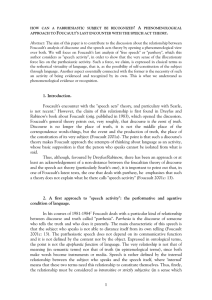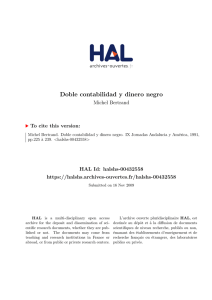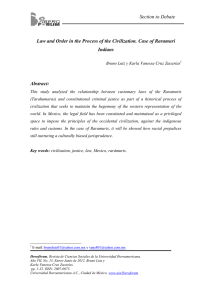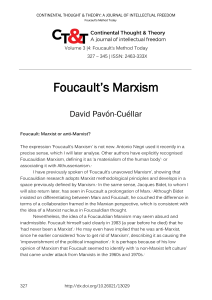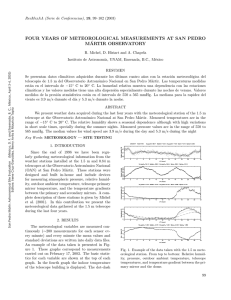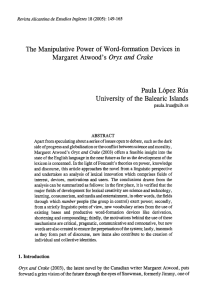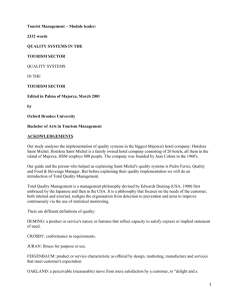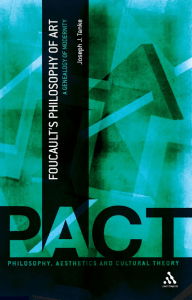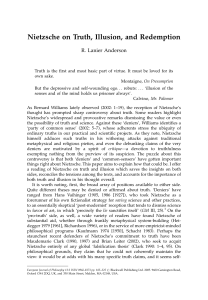The Birth of the Subject: Michel Foucault and Norbert
Anuncio
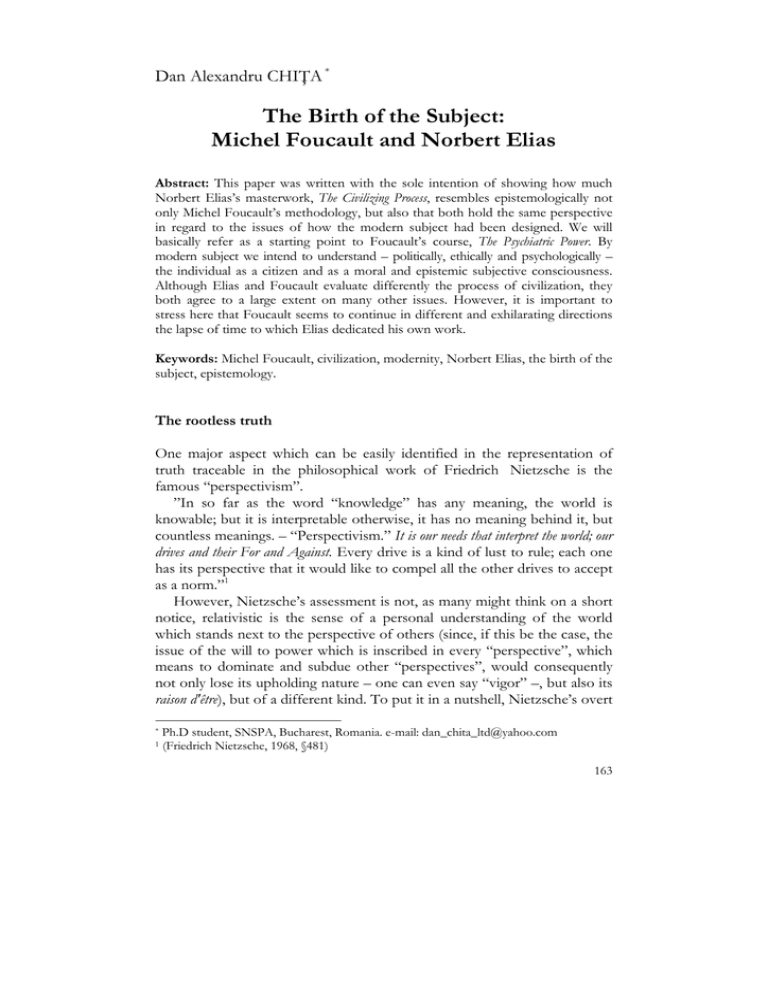
Dan Alexandru CHIŢA Dan Alexandru CHIŢA * The Birth of the Subject: Michel Foucault and Norbert Elias Abstract: This paper was written with the sole intention of showing how much Norbert Elias’s masterwork, The Civilizing Process, resembles epistemologically not only Michel Foucault’s methodology, but also that both hold the same perspective in regard to the issues of how the modern subject had been designed. We will basically refer as a starting point to Foucault’s course, The Psychiatric Power. By modern subject we intend to understand – politically, ethically and psychologically – the individual as a citizen and as a moral and epistemic subjective consciousness. Although Elias and Foucault evaluate differently the process of civilization, they both agree to a large extent on many other issues. However, it is important to stress here that Foucault seems to continue in different and exhilarating directions the lapse of time to which Elias dedicated his own work. Keywords: Michel Foucault, civilization, modernity, Norbert Elias, the birth of the subject, epistemology. The rootless truth One major aspect which can be easily identified in the representation of truth traceable in the philosophical work of Friedrich* Nietzsche is the famous “perspectivism”. ”In so far as the word “knowledge” has any meaning, the world is knowable; but it is interpretable otherwise, it has no meaning behind it, but countless meanings. – “Perspectivism.” It is our needs that interpret the world; our drives and their For and Against. Every drive is a kind of lust to rule; each one has its perspective that it would like to compel all the other drives to accept as a norm.”1 However, Nietzsche’s assessment is not, as many might think on a short notice, relativistic is the sense of a personal understanding of the world which stands next to the perspective of others (since, if this be the case, the issue of the will to power which is inscribed in every “perspective”, which means to dominate and subdue other “perspectives”, would consequently not only lose its upholding nature – one can even say “vigor” –, but also its raison d'être), but of a different kind. To put it in a nutshell, Nietzsche’s overt * 1 Ph.D student, SNSPA, Bucharest, Romania. e-mail: dan_chita_ltd@yahoo.com (Friedrich Nietzsche, 1968, §481) 163 The Birth of the Subject: Michel Foucault and Norbert Elias purpose is to give a mortal blow, once and for all, to the metaphysical pretence of ethical or epistemological absolutes, such as the ones present in established monotheistic religions (especially Christianity) or in the philosophical ghosts such as noumenon, Ding an sich etc. As a side effect, Nietzsche’s corrosive power willingly extends over the realm of historical writing. His unhidden aim is to decipher the hidden agenda of traditional historians, focused to write down an all-encompassing meta-history, pulled along by the singularity of only one epistemic thread. In this way, Nietzsche struggles to unleash history from the hands of the historians of his time (but also from the historians of bygone periods in the past) and, only by judging retrospectively, one may say that his efforts were not, after all, futile. Instead of one history which gives credit to historicism and the non-accidental strings of causes and aims which ostensibly explain history, Nietzsche depicts the maelstrom of many small histories that are purposeless and have a myriad of incoherent causes. “At last, effective history is a perspectivist history. If traditional histories tend to hide the place from which they look at events – their actual situation – leaving the impression of a pure, unsituated objective vision, the historical sense does not only un-hides its place, but it is also aware of it, states it and evaluates the world according to its points of view. It knows, in other words, that its own perspective is a means by which it gains control over something which is near it, an oppression over other points of view, a criterion of saying “no” to a huge number of things, but, at the same time, the only means of saying “yes” to plentiful other things. It is the way by which from every energy center the world itself gains form and, simultaneously, the world of history.”2 Consequently, we may reasonably add that, in most respects, this Nietzschean historical view has been organically embedded in the whole historiographical “toolkit” of Michel Foucault, one of the two thinkers we are going to devote half of the present article. Against this normative essentialist single understanding of history, stemming from the philosophic body of Friedrich Nietzsche’s works, has Michel Foucault grew his own “archeology of knowledge”, more precisely, the historical knowledge which is void of any transcendental meaning and no more than a patchwork of closely knitted singular histories, as Michel Foucault demonstrates in all his books, articles and even courses. In fact, following the exact lines of this Nietzschean influence, we may quote: “In placing present needs at the origin, the metaphysician would convince us of an obscure purpose that seeks its realization at the moment it arises. Genealogy, however, seeks to 2 (George Bondor, 2005, 88-107) 164 Dan Alexandru CHIŢA reestablish the various systems of subjection: not the anticipatory power of meaning, but the hazardous play of dominations”3 At the opposite side of the spectrum lies another major modern thinker, this time a sociologist whose is closely linked to a reevaluation of the whole sociological hermeneutics in the second half of the 20th century, Norbert Elias. Our basic concern here is to retrace the logic behind Elias’s masterpiece, The Civilizing Process, written shortly before the onset of the Second World War only to be rediscovered by the academic community three decades afterwards. As asserted by Dolan, “For Elias, the concept of time is central to both social development (in a non-teleological sense) and self-development (in an non-normative sense)”.4 Although, as we will see, Norbert Elias does not pinpoint a clear assimilation of Nietzschean thinking, he proceeds extremely similar in his analysis of the birth of the European civilization as influenced by a Nietzschean perspectivist fashion. The many stages through which the Western societies pass in the Middle Ages is a testimony of an ever-changing subject; therefore, Elias’s historical analysis, irrespective of how continuous it may seem at a first glance, is pervaded by so many epistemological gaps that there would be no reason to assert a deterministic view point which would place Norbert Elias next to the respectable yet untrustworthy traditional historians. As Foucault states at one point: “From these elements, however, genealogy retrieves an indispensable restraint: it must record the singularity of events outside of any monotonous finality; it must seek them in the most unpromising places, in what we tend to feel is without history--in sentiments, love, conscience, instincts; it must be sensitive to their recurrence, not in order to trace the gradual curve of their evolution, but to isolate the different scenes where they engaged in different roles. Finally, genealogy must define even those instances when they are absent, the moment when they remained unrealized (Plato, at Syracuse, did not become Mohammed).”5 Norbert Elias proceeds accordingly: and it is in this focus on matters of “sentiments, love, conscience and instincts” in the process of civilization, Western that is, which we will also muse over in the next pages. Our basic assumption is that in the building of the modern subject – political, ethical, psychological – both Norbert Elias and Michel Foucault put forward a similar genealogy. There is already a well-established and dense literature on Elias and Foucault, including studies which are solely concerned with tracing the commons elements in their works, but, although not pretending to be extremely original in our analysis, the question of (The Foucault Reader, 1984, 83) (Paddy Dolan, 2010, 8-27) 5 Ibid. 3 4 165 The Birth of the Subject: Michel Foucault and Norbert Elias designing the modern subject has not been directly posed before. As we will strive to prove below, it is the very moment when Norbert Elias finishes his masterpiece The Civilizing Process that Michel Foucault’s intriguing uncovering of the historical layers which make the modern subject begins. Our ambition is to try to show that, in spite of two thinkers who come from different intellectual traditions, there is a clear identity in terms of what both acknowledge as the building of the modern civilized individual. In one of the essays dedicated to Michel Foucault, Hayden White brilliantly summarizes the basic content which lies beneath the new historiographical edifice, carved and shared by Foucault and Elias respectively: “Such a conception of historiography has profound implications for the assessment of the humanistic belief in a “human nature” that is everywhere and always the same, however different its manifestations at different times and places. It brings under question the very notion of a universal humanitas on which the historian’s wager on his ability ultimately to “understand” anything human is based.”6 Two Types of Truth Instead of focusing on the grand achievements of Michel Foucault’s work, which are in many terms quite well-known for a social scientist, his public courses held at the College of France during the 1970s can also provide us with a fountain of knowledge. Consequently, to Foucault, in his public lectures on the psychiatric power, the epistemological changes which surfaced the European mindset are more or less questions of different technologies, in the sense of a wellstructured system of techniques employed on a political body in order to transform it into something else than before. The choice of using The Psychiatric Power to our analysis of the building of the modern subject lies in the fact that, also according to Elias as we shall see, whole societies have undergone a series of deep psychological shifts from one age to another. One aspect that stands beneath the large chasm between the modern industrial world of the early nineteenth century and its predecessors, namely the broadly defined classical age, is what Foucault calls the distinction between a “truth-event” and a “truth-demonstration”.7 Both “truths” are subject to the question of inquiry and investigation. While the former is a typical embodiment of the medieval mental outlook in which the whole fabric of society was not part of an organized central body, i.e. the state, to hold it together into a generalized cobweb of small epistemological “traps”, 6 7 (Hayden White, 1973, 257) (Michel Foucault, 2008) 166 Dan Alexandru CHIŢA the latter is the epitome of control: “inquiry, record, confession, recovering information, the movement of knowledge from the center of power to its point of actualization and its feedback, have constituted the instruments of a political and economic power such as the industrial society”.8 What Foucault sees here is the shift from a fiscal “individuality” – the only power to which Medieval Europe was accustomed (Elias strengthens Foucault’s contention by arguing that the first well-established fiscal system in the Middle Ages was temporary and designed by the big landlords as to squeeze enough money from the people in order to defend them by waging wars; however, when the wars ended, the issues of taxing still remained in function since society had to be potentially endlessly defended against other foreign enemies) – to a “police investigation” when, in this particular occurrence, the already established state feels the urge to protect the citizenry against itself by instituting a series of devices of control and repression, of surveillance and punishment – as if the medieval war was becoming a matter of domestic long-lasting policy of perpetual fight against socially “abnormal”, “deviant” citizens with the sole aim to mould the citizens themselves into what the central power finds fit. As a result, the “truth-event” is constructed accidentally and does not posses a meaning in itself. What Foucault points here rests in his belief that the largely non-restricted individual behavior or collective interaction of the pre-industrial human being were, in many ways, freer than the “closed” societies of modernity, which are constantly submitted to a series of “demonstrations” and “findings” in order to prove the universal truth of a given central power. At this point, one might reasonably say that Michel Foucault has turned Nietzsche’s perspectivism into a matter of grand-scale historical display, wherein the power of the historical perspective spreads of the canvas of history itself, leaving no space intact. Michel Foucault depicts the steps taken from one “truth” to another in the following way: “Then, not only did a local refining take place, but also a worldwide planetary extension. The double action of colonization: the profound colonization, which penetrated the manners, the body and the thinking of individuals, and then the colonization at the level of territories and surfaces. One can say that we are witness to, from the end of the Middle Ages onwards, the placing into a generalized investigation of the entire surface of the earth, right to the most refined core of things, of bodies and of gestures: a sort of a large inquisitorial parasitism; in other words, we can and must ask the question of truth at any moment, anywhere in the world and concerning anything. There is a truth for all and the truth waits for us in every place, anywhere and anytime. This is a very schematic 8 (Michel Foucault, 2008) 167 The Birth of the Subject: Michel Foucault and Norbert Elias account of the grand process which led to this transformation, from a technology of the truth-event to a technology of truth-finding.”9 As always with Foucault, his breathtaking critique is not meant to derive a set of historical “rules” which have only been reshaped from time to time, but, more cogently, the stock from which recorded history is made resembles to a significant degree the epistemic framework embedded in the so-called “modern subject” – as the repository of our political, ethical and psychological attitudes. Therefore, there is no universal truth, as the “truth-demonstration” aims to persuade us, without a universal subject on which the mark of this “truth” is beforehand printed. However, owed to the arbitrariness and the versatility of a pre-modern society, the scarcity of the “truth-demonstration” is painstakingly obvious. Given the fact that on the one hand the newestablished truth yearns to be universalized and on the other hand that the individual capable of recognizing this truth is scarce in number, there would be felt the need for a “qualified subject”10 which will instill a “certain set of procedures” and precisely through the means of “pedagogy and selection”, that is, to put it differently, the acknowledged task of the socially respectable epistemological foci – “universities, scientific societies, canonical teaching, schools, laboratories, the game of specializations, the game of professional qualifications, all these represent a way of administering, in regard to a truth set by science as universal, the scarcity of those who can take part in it.”11 Hence, although the abstract right of any individual is encrypted is the potentiality of turning into a “universal subject”, it is only by the interfering role of a few “qualified” and reputable epistemic authorities that the “universal subject” gains momentum and reality12. “In direct connection with this extension of the position of the scientific truth, the emergence of philosophers, of scientists, of intellectuals, of teachers, of laboratories etc. in the history of the Western world beginning with the eighteenth century corresponds exactly with the refinement of the person who can know a truth that is from now on present anywhere and anytime.”13 For the purpose of redrawing the lines of Foucault main argument, let’s summarize his perspective with the help of the next brief scheme: i) in political terms, what took place between pre-modern and modern world has been a gradual centralization of power into the hands of a centralized elite, which held tight sway over its subjects; generation by generation, the elite Ibid. Ibid. 11 Ibid. 12 Reality in the narrow sense of: “Society is a human product. Society is an objective reality. Man is a social product.” (Berger, Luckmann, 1966) 13 (Michel Foucault, 2008) 9 10 168 Dan Alexandru CHIŢA power has been transferred into the impersonal sovereignty of the secular state (in contrast with the personal sovereignty of divine grace of the medieval king or emperor as present in Eric Kantorowicz’s masterpiece14) as if the small-scale political truth of a restricted number of landlords generalized into becoming its opposite: the truth of an entire body of citizens, regulated by the impersonal state or rather a state with a ubiquities and thus invisible persona (which, not incidentally, is Latin for mask and appearance), ii) the ethical values, together with manners of all sorts, of a given community enlarged, encompassed and engulfed an ever-growing society by the means of placing a rule of conduct over all minor details of daily living (Norbert Elias’s stresses this especially in his assessment of the civilizing process) and iii) the psychological aspect cannot be cast aside, since through the escalating importance of the clericals (by this I refer to all intellectual and educational professions in the sense attributed to the term by Julien Benda) the human psyche has rendered their civilizing role as mandatory for the consolidation of the modern state as possible; accidentally, in the laboratory of the interspersed power and knowledge relation even the concept of psyche receives meanings which have never been thought before or for which nobody was aware, that is the psychological state implement defining the psyche itself (and at this point, Foucault’s studies contribute a great deal to the dis-covering or un-covering of madness and irrationality, or, to stress it in his own cords, the ‘depsychiatrization’ of the psyche). As a matter of fact, all these permutations, which happen organically almost simultaneously as to draw a new unprecedented Weltanschauung, receive a colorful dynamism and an explicit treatment in Norbert Elias’s chef-d'œuvre The Civilizing Process. From civilization to Foucault The primordial tenet which can be found in The Civilizing Process, almost its backbone, is an intriguing paradox: inasmuch the society increases its level of interconnectedness in the road to modernity so does “the people’s feeling of being isolated from one another”15 increase. Those “ever denser relations of mutual interdependence” define to a large extent what the individual is, but at the same time the individual feels the distinction between oneself and others more and more. The first volume of Elias’s “However, the jurists’ custom of borrowing from ecclesiology and using ecclesiastical language for secular purposes has its own tradition of long-standing, for it was a practice as legitimate as it was old to draw conclusions de similibus ad similia.” (Kantorowicz, 1997, 19) 15 (Smith, 2001, 21) 14 169 The Birth of the Subject: Michel Foucault and Norbert Elias masterpiece analysis the birth of manners (or etiquette) in the Western world having as a target their development within the higher social echelons – the pre-modern aristocratic classes of Europe’s nobility – as a token of the society’s advance on its civilizing road. Even here we can draw a comparison between what Foucault refers to as the “the great confinement” and this self-referential attribute of the pacified and settled European aristocracy during the late Middle Ages. “As the social standards regarding bodily comportment and control became more onerous and exacting, practices and conduct previously considered acceptable or unremarkable had increasingly to be hidden‚ ‘behind the scenes‛ of social life, if not altogether banished. There is even some convergence in the methodological use of etiquette, training and conduct manuals to examine people’s expectations of each other.”16 Elias’s mind opening study concentrates on the social circumstances in which today’s common knowledge has been borne: “when, where and how you should blow your nose, spit, sneeze, scratch yourself, enjoy sex, throw a punch, break wind, urinate and defecate.”17 All these “impolite public” practices are not the fruit of common sense, as we shallowly think nowadays, but are the product of a long (and still early) process of civilization which originated in the courtier manners of the feudal lords (as a means by which they could distance themselves from the rest of the society and ingrain the artificial inequality for which their forefathers strove and fought for into the nature of the whole community) and have ever since slowly generalized to the rest of the classes and later on acquired an ostensible scientific grounding in our modern times. As Norbert Elias states: “[I]t) is precisely fears of the loss of distinguishing hereditary prestige... that have to this day a decisive part in shaping the prevailing rule of conduct. Precisely those fears... are particularly predisposed to internalization; they, far more than the fear of poverty, hunger or direct physical danger, become rooted in the individual member of such classes, through his upbringing, as inner anxieties which bind him to a learned code almost automatically, under the pressure of a strong super-ego, even independently of any control by others. The continuous concern of parents whether their child will attain the standard of conduct of their own or even a higher class, whether it will maintain or increase the prestige of the family... fears of this kind surround the child from its earliest years... They continuously add fuel to the every circle of inner anxieties, which hold the behaviour and feelings of the growing child permanently within definite limits, binding him to a 16 17 (Paddy Dolan, 2010, 16) (Paddy Dolan, 2010, 22) 170 Dan Alexandru CHIŢA certain standard of shame and embarrassment, to a specific accent, to particular manners, whether he wishes or not.”18 Therefore, contrary to Foucault’s criticism of the modern state and its control over society, in Norbert Elias’s description the process is valued in a positive way, ascertaining rather the risk on the fall into sheer barbarity of those societies which have entered lately on their civilizing path or which haven’t even begun it. But how do we distinguish barbarity from civilization? How does the Freudian super-ego get borne and what was the role of the state in it (even Freud agreed on the importance of self-control and repression in Civilization and its Discontents)? These are Foucauldian elementary inquires and points of departure into his body of work. According to Elias, at the onset of feudalism “life was a bloody round of struggles for survival and local supremacy”.19 Violence, fear, raw physical strength were all part and parcel of the Zeitgeist. “When top-down authority was loose or fragmented, there was no consistent external pressure upon subjects (imposed by a lord or a king) to curtail these violent emotions and drives. Restraints upon human urges were intermittent, irregular and unstable, whether those restraints were imposed by other people or exercised within the self.”20 One by one, the power fell into the hands of a few “castle-based dynasties” which erected “stable centralized regimes.” The bureaucratic apparatus was employed to manage the territory. The city-dwellers, the ongrowing seeds of the future bourgeois class, and then the peasantry were taxed accordingly in order to pay for the landlord’s military campaigns. “Tighter, more centralized external controls produced greater selfcontrol within the subordinate population. The civilized habitus was calculating and controlled, devious and detached. It first took root in the court, later spread to the bourgeoisie and, still later, found expression in the lives of ordinary people throughout society. It was a central aspect of the civilizing process, closely related to the development of stable power monopolies, especially the bureaucratic state, and the growth of a complex urban-industrial occupational structure and market.”21 The issues of self-restraint was built into upper stratum as an indication of what separated them (and guaranteed their supremacy from the rest of the society): table manners, way of talking and interactions and other aristocratic paraphernalia. The transformation of warrior aristocracy into court nobility lasted for a number of centuries, but this led to the (Nobert Elias, 1994, 521-522) (Smith, 2001, 22) 20 Ibid. 21 (Smith, 2011, 23) 18 19 171 The Birth of the Subject: Michel Foucault and Norbert Elias “restraining of aggression and sexuality” together with a “mutually reinforced” “increase in surveillance and discipline: centralized, interpersonal and psychological”.22 What was repugnant, gross was thrown “behind the scenes” while “the threshold” of decency and acceptability increased with the passing of time, filling the banned lists with what was widely acclaimed as “normal” and “acceptable” in past epochs. Thus, what was once a matter of arbitrary wills and wishes – their “truth-event” consisting in raising taxes for armies or conscripting soldiers for the sake of defense and protection – had been switched into a truth for all which could have been easily demonstrated by logical inquiry: first at the level of the court and then, employing the force of the state-control or the divine power invested in the sovereign and, then, by the pursuit of scientific domination over all worldly beings, over the entire political body, the realm of subjects and citizens. “At court they bowed, scraped and played by the rules of etiquette. These rules decreed who should defer to whom, how, and when. Life at court involved rigid self-control, calculated use of resources, and careful pursuit of selfinterest. At court everyone watched everyone else. It was rather like a poker game. The emotional cost of self-restraint was high, especially for those low in the pecking order. As Elias shows, minor nobles wrote minor novels full of carefree shepherd folk. They mourned their own lost freedom.”23 At this point, one can easily equate the specific “freedom” with the same for which Foucault (and, to an increased degree, even Nietzsche) pleaded all throughout his books, but, as already mentioned, Elias tends to go along with the course of civilization rather then upholding a state of affairs which precludes the advent of modernity. Elias’s main interest has always been to argue in favour of “the pacification” trait of “the great confinement” and almost never on the violence exerted by the visible hand of the state. I believe that most similarities should be evident and self-explainable by now. However, what Elias saw, along with others, is that, as long as we are confined to holding back our aggressive urges and instincts there is a considerable chance that we might fall into the mistake of believing that “the civilized environment” has been always around, as if this thin layer of self-security is in fact giving us “a false sense of our own nature”.24 The underlying dichotomy present here is between the self, as something which protects us from the exterior world and fuels us with the feeling of selfsecurity (in fact, this self is no more than the social subject built up by civilization), and the outside, standing aloof from ourselves as the domain of perceptions, representations, unreal images and incertitude, whereas, using Ibid. (Smith, 2001, 25) 24 (Smith, 2011, 26) 22 23 172 Dan Alexandru CHIŢA the concept coined by Elais, this “homo clausus” is a false pretense since there is no such thing as an individual which is not open to the influence and quite intelligible confines of the modern society. “Homo clausus is a myth”.25 In spite of Foucault’s sometimes radical claim that society is being monitored by a huge network of eyes searching within the blood and bones of people for anything “suspicious” that might contradict the status quo own reproduction, if we believe in the epistemic consistency of this Panopticon we have no reasons to assert that impersonal discipline is more natural than what Norbert Elias claims to be the “homo clausus”, another instrument by the means of which epistemological scaffolds are being built. Both representations are artifacts of the human mind, things made and ordered by human skill and precision. “The crux of the civilizing process is that people became more self-steering and self-restrained through lengthening and differentiating interdependent links between more and more people. This is obviously a long-term process that takes time, but social interdependencies can also shorten and simplify over time.”26 The “link” is another way of postulating the intricate force of collective mutual imitations. For the object of our present interest, what’s worthwhile in mixing together Elias’s analysis in The Civilizational Process and some fundamental concepts present in Michel Foucault’s work might be the very continuation between the two thinkers legacy: despite the fact that Elias tries to offer a more historically-rooted depiction of how society had been shaped by the civilizational surge whereas Foucault is more interested in the relations of power and employs history as an instrument for his own “archaeologies”, there are enough proofs to affirm that both thinkers perceive the forces beyond modernity as a restructuring and reshuffling of the individual as a subject of imposed and self-managed knowledge. As we have indicated above, Elias main concern as the first school of civilizing is to be found in the “royal court”. The “stable power monopoly” led to a softening of manners and aristocratic behavior, which was at the on-start as gruesome as the popular one, strengthening self-control and rationality. “Although they might well have socialized each other, so to speak, into a civilized habitus, other, weaker social groups acquired modified versions of this habitus either as willing tutees receiving authoritative instruction or as subordinates shaped and conditioned `from above' within institutional orders (the church, the state, the professions) over which they had very little influence in normal everyday life.”27 Therefore, what is partly Ibid. (Paddy Dolan, 2010, 20) 27 (Smith, 2011, 169) 25 26 173 The Birth of the Subject: Michel Foucault and Norbert Elias missing or with reduced powers in Elias’s analysis can be indicated by the use of Foucault’s works, who gives the answer to the query of how did the whole society managed to be civilized. The possible answer could be indicated by the impersonality, rigorist bureaucracy and universalized medieval “truth-event”, the one dictated by the whims and the follies of the savage predator, the direct ancestor of the courtier. It is noteworthy to compare two procedures, taken as testimony to the invading power of civilization and to the intensity to which our attitudes have been taught the logic of shame, disgust and pity (for which we have no clue as to whether they are more natural than physics or biology): “The modern rituals of execution attest to this double process: the disappearance of the spectacle and the elimination of pain. The same movement has affected the various European legal systems, each at its own rate: the same death for all – the execution no longer bears the specific mark of the crime or the social status of the criminal; a death that lasts only a moment – no torture must be added to it in advance, no further actions performed upon the corpse; an execution that affects life rather than the body. There are no longer any of those long processes in which death was both retarded by calculated interruptions and multiplied by a series of successive attacks. There are no longer any of those combinations of tortures that were organized for the killing of regicides, or of the kind advocated, at the beginning of the eighteenth century (…), by which the condemned man would be broken on the wheel, then flogged until he fainted, then hung up with his chains, then finally left to die slowly of hunger. There are no longer any of those executions in which the condemned man was dragged along on a hurdle (to prevent his head smashing against the cobble-stones), in which his belly was opened up, his entrails quickly ripped out, so that he had time to see them, with his own eyes, being thrown on the fire; in which he was finally decapitated and his body quartered. The reduction of these 'thousand deaths' to strict capital punishment defines a whole new morality concerning the act of punishing.”28 Conclusions After coming to grips with the question of the building of the subject within the Western European culture in the writings of Norbert Elias and Michel Foucault, it would useful to x-ray the modern subject according to what both thinkers have in common in terms of thinking: as a political entity, the modern subject is the product of centuries of centralization and of the monopoly of legitimate violence exerted by the modern state apparatus; 28 (Michel Foucault, 1995, 11-12) 174 Dan Alexandru CHIŢA without the state, the modern citizen (under the guises of taxpayer, possibly army-conscript in periods of state peril, student, pensioner, patient, convict, public servant and so on) would not have existed in the form we are aware of and accustomed to. In fact, it wouldn’t have existed at all. The whole sequence of civilized practices pays tribute to the quintessential relevance of moral traits, most of them secularized, but still permeated by a censorship (or at least a weakening) of the senses. As an axiological unit, the modern subject has passed through a series of rationalized practices (Foucault) with the sole aim of controlling exceptions and abnormalities (lest the danger they pose to society at large) or they have been “tamed” by the civilizing process, gaining control over their instincts and repressing the chaotic energies that delve within the psyche. Moreover, proceeding like this, Elias emphasizes the creation of the ego and the super-ego as embodiments of historical topoi which may fade away any time under the crushing force of the driving forces within us. Implicitly, Elias embraces the need for civilization as a means by which reason comes to terms with natural needs and necessities, whereas Foucault finds refuge into the unknown, the irrepressible irrational self as the true chamber of man’s freedom. Our manners are conditioned by societal interaction. There are no hidden essentialist pillars behind the way we sit and eat at the table or the way we engage in sexual conduct. However, society might contradict such a statement by imposing informal rule of conducts which are binding and coercive nevertheless, indicating both its strengths and their feeble nature, if there is any beyond our consciousness. Last but not least, the way we perceive ourselves, the psyche itself, has been the object of thorough and persistent study by Elias and Foucault alike. As Dennis Smith affirms: “They are both deeply interested in the links between how we `manage' or `cope with' our bodily urges and how we conceptualize the `self', its substance, capacities and obligations. They are both also trying to unravel the complexities of those areas of human conduct in which how human beings manage natural functions such as sex, excretion, eating and drinking has a close relationship to the way they try to survive or advance themselves by managing their health, marriage, patterns of friendship and political intrigues.”29 Whether or not constructing the self through a set of radical changes from one historical period to another has been a daily business of societies themselves or whether it had been the enterprise of a few selected elites, what undoubtedly rings true to the ear is that creating a concept (such as ideal of chivalry or courtly love or what meant to be an honnête homme in seventeenth century France or what madness was in the sixteenth century) 29 (Smith, 2001, 106) 175 The Birth of the Subject: Michel Foucault and Norbert Elias ultimately led to the structuring along intricate links of the whole intelligible world. Irrespective of the difference between Elias and Foucault, both seem to agree to a large degree on the matters discussed here since history is ultimately a matter of conscious history building in progress. References Berger, P.L. and Luckmann, T. The Social Construction of Reality: A Treatise in the Sociology of Knowledge, Garden City, NY: Anchor Books, 1966. Bondor, George, ‘Genealogy and History. Michel Foucault’s Reading of Nietzsche’, Hermeneia, 05/2005, pp. 88-107. Dolan, Paddy, ‘Space, Time and the Constitution of Subjectivity’, Foucault Studies, No. 8, pp. 8-27, February 2010. Elias, Norbert The Civilizing Process (originally in two volumes: volume 1, The History of Manners, volume 2, State Formation and Civilization), translated by Edmund Jephcott, Oxford: Blackwell, 1994. Kantorowicz, Eric The King’s Two Bodies, A Study in Medieval Political Theology, Princeton University Press, Princeton New Jersey, 1997. Foucault, Michel Puterea psihiatrica, Cursuri tinute la College de France (1973-1974), Idea Design & Print Editura, Cluj, 2006. Foucault, Michel Psychiatric Power: Lectures at the Collège de France, 1973--1974 (Lectures at the College de France), Picador 2008. Foucault, Michel Discipline and Punish: The Birth of the Prison, Vintage Books, 1995. The Foucault Reader, Paul Robinow editor, NY: Pantheon, 1984, “Nietzsche, Genealogy, History”. Nietzsche, Friedrich The Will to Power, Vintage, translated by Walter Kaufmann and R.J. Hollingdale, 1968. Smith, Dennis Norbert Elias and Modern Social Theory, Sage Publication, 2001. White, Hayden “Foucault Decoded: Notes from the Underground”, History and Theory 12, no. 1 (1973) in Tropics of Discourse. Essays in Cultural Criticism, Baltimore: The Johns Hopkins University Press, 1978. 176
